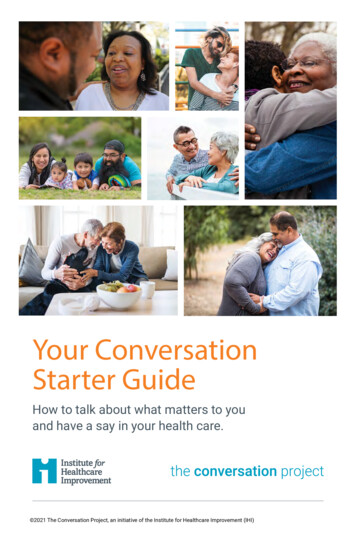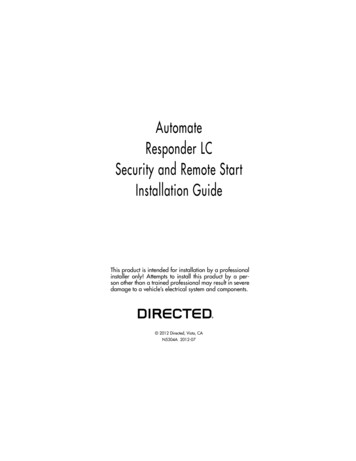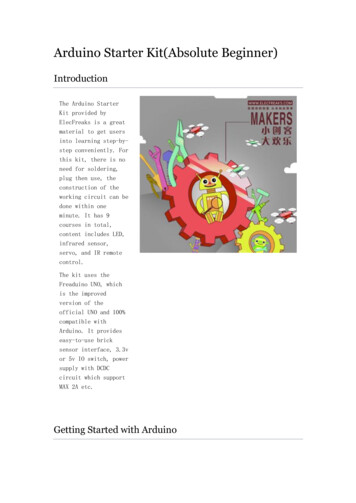
Transcription
Your ConversationStarter GuideHow to talk about what matters to youand have a say in your health care. 2021 The Conversation Project, an initiative of the Institute for Healthcare Improvement (IHI)
We can’t plan for everything. But we can talk aboutwhat is most important — in our life, and in ourhealth care — with those who matter most.Talking with the important people in our life can bring us closer together.It also helps us create the foundation of a care plan that’s right for us —a plan that will be available when the need arises.The Conversation Project wants to help everyone talk about their wishesfor care through the end of life, so those wishes can be understood andrespected. We created this guide to help you start a conversation (and keeptalking) so you can have a say in your health care — today and tomorrow.It’s also important to choose what’s known as a health care proxy, or healthcare advocate — someone who would make health care decisions on yourbehalf if you became unable to voice those decisions yourself. Visit ourGuide to Choosing a Health Care Proxy for guidance on picking a proxy.If you are completing this document on a computer, first save it to yourdesktop with a name you can easily find again. Then open your saveddocument and type in your answers. (Otherwise, what you type will not besaved.) Completing it on your computer will create a digital document thatyou can easily share with others.We’ll help you take itstep by step.You can take your time! There’sno need to say everything thatmatters in one conversation —you can start talking, then keeptalking. It’s all about what worksbest for you.STEP 1Think About What Matters to You. . . . . 3STEP 2Plan Your Talk. . . . . . . . . . . . . . . . . . . . . 4STEP 3Start Talking. . . . . . . . . . . . . . . . . . . . . . . 8STEP 4Keep Talking . . . . . . . . . . . . . . . . . . . . . 11This document does not seek to provide legal advice.2The Conversation Project theconversationproject.orgInstitute for Healthcare Improvement IHI.org
STEP 1Think About WhatMatters to YouTo get ready to talk about what matters to you and your wishes for carethrough the end of life, it’s helpful to gather your thoughts as a first step.You don’t need to have the conversation just yet. Here are some helpfulways to think about what matters to you and prepare for your conversation.›What does a good day look like for you?SOME IDEAS›What or who supports you during difficult times?SOME IDEAS›Is it time with family or friends? Enjoying favorite everyday activities?What do you need to enjoy a good life — through the end of life?Your faith, culture, family, friends, petsTry finishing this sentence:What matters to me through the end of my life is.SOME IDEASBeing able to recognize my children; being independent;being able to spend time with the ones I loveThat’s your “what matters to me” statement.Sharing it with people you trust could be a big help if they need to communicatewith your health care team one day. They may need to share what’s importantto you and what you need to be able to have a good day. They also may need todecide what type of treatment you’d want to receive. Completing this guide willhelp you refine what you want them to know about what matters to you.The Conversation Project theconversationproject.orgInstitute for Healthcare Improvement IHI.org3
STEP 2Plan Your TalkHaving a say in your health care is more likely if you share how you feelabout certain situations that could arise now, in the future, and towardthe end of life.For each statement below, mark the place on the line that is closest towhat you think or believe about each statement now. There are no “right”or “wrong” choices — your answers are about what works for you.›As a patient, I’d like to know Only the basicsabout my conditionand my treatment›All the detailsabout my conditionand my treatmentWhen there is a medical decision to be made, I would like My health careteam to do whatthey think is best›To have a sayin every healthcare decisionWhat are your concerns about medical treatments?I worry thatI won’t getenough care4The Conversation Project theconversationproject.orgI worry thatI’ll get toomuch careInstitute for Healthcare Improvement IHI.org
›If I am diagnosed with a serious illness that could shorten my life,I would prefer to Not know how quicklyit is progressing or mydoctor’s best estimationfor how long I have to liveUnderstand how quicklyit is progressing and mydoctor’s best estimationfor how long I have to live›Any other notes you want to add?›If you were seriously ill or near the end of your life, how muchmedical treatment would you feel was right for you?I would want to try everyavailable treatment toextend my life, even ifit’s uncomfortable›I would not want to trytreatments that impactmy quality of life in orderto extend my lifeWhere do you prefer to be toward the end of life?I strongly prefer to spendmy last days in a health carefacility (hospital, assistedliving, or nursing facility)The Conversation Project theconversationproject.orgI strongly preferto spend my lastdays at homeInstitute for Healthcare Improvement IHI.org5
›Now, look at your previous answers. What do you notice about thekind of health care you said is right for you?›If you weren’t able to speak for yourself, would you want people to followall your wishes or do what they think is best in the moment?I want the people I trust to doexactly what I’ve said, even ifit makes them uncomfortable›When it comes to sharing information about my health with others I don’t want those closeto me to know all thedetails about my health›I want the people I trust to dowhat brings them peace, even ifit’s different from what I’ve saidI am comfortable with thoseclose to me knowing all thedetails about my healthWhen I die I want tobe alone6The Conversation Project theconversationproject.orgI want to be withother peopleInstitute for Healthcare Improvement IHI.org
›What specific information would you want (or not want) shared withcertain trusted people?›Look at your previous answers. What are the most important thingsfor your friends, family, and health care team to understand aboutwhat matters most to you through the end of life?The Conversation Project theconversationproject.orgInstitute for Healthcare Improvement IHI.org7
STEP 3Start TalkingHow much do the people who matter to you know about what mattersmost to you? There may be some things they already know, and otherthings that you need to tell them. Sometimes we might think othersknow how we feel, but they don’t. Conversations help make what wethink and how we feel as clear as possible.›Who needs to know what matters to you in your health care?Check all that apply:›Parent(s)Trusted friend(s)Spouse/partner(s)Doctor(s)Chosen family member(s)Nurse practitioner/nurse(s)Adult child/childrenSocial workerFaith leader (minister, priest,rabbi, imam, etc.)Other:Where would you feel comfortable talking?At the kitchen tableVideo chat or phone callAt a favorite restaurantAt my place of worshipIn the carOther:On a walk›The Conversation Project uses the saying, “It always seems too soon,until it’s too late.”When will you start this conversation?8The Conversation Project theconversationproject.orgInstitute for Healthcare Improvement IHI.org
You’ve gathered your thoughts, written down yourideas, and picked your trusted people. Now, how doyou begin a conversation?›This list doesn’t cover everything, but here are some things you cansay to start talking. ›“I need your help with something.”“Can you and I have a conversation about“ I was thinking about what happened tomade me realize?”, and it.”“ Even though I’m OK right now, I’m worried that,and I want to be prepared. Can we talk about some things that matter to me?”“Will you help me think about my future?”“ I heard about the Conversation Project and answered some of their questionsabout things that matter to me when it comes to my care through the end of life.I’d like to talk to you about it.”“ Whendied, do you think their wishes and priorities wererespected toward the end of their life?”Here is a list of some other things you may want to cover when you talk. Do you have any worries about your health? hat do you need to address to feel more prepared (examples: finances, property,Wlegal documents, relationships, health care situations)? o you have any fears, concerns, or mistrust about where or how youDreceive health care?Who do you want (or not want) to be involved in your health care? hen you look ahead to the future, are there important events or datesWyou hope you’re there for? re there kinds of treatment you would want or not want (examples: resuscitationAattempts, ventilation, feeding tube)?I f your health condition changed, when would it be OK with you to shift from tryingto cure an illness to trying to enjoy the end of life as much as possible?The Conversation Project theconversationproject.orgInstitute for Healthcare Improvement IHI.org9
Tips for your talkImagine the conversation in your mind first. You can even write a letterthat explains your values about the kind of care that works for you tofigure out words that feel comfortable for you to use. 10 ou can also consider having a practice conversation, so you feel as preparedYas possible to have a “real” conversation. ou don’t have to talk about everything or talk to everyone in the firstYconversation. In fact, we suggest you keep talking over time! e patient. Some people are nervous or may need time to get ready to talk.BEvery time you start a conversation, it helps you come closer to making yourwishes fully known. Keep trying. ou don’t have to lead the whole conversation; it’s important to also listenYto what the other person says so you can build trust. othing you say is permanent. You can always change your mind as thingsNchange in the future. ou may find out during these conversations that you and your trusted peopleYdisagree. That’s OK (no judgment!). The important thing is that you’re talkingnow and to keep talking — so you’re prepared in case your health changes. ou can share this guide, with or without your thoughts included,Ywith your trusted people.The Conversation Project theconversationproject.orgInstitute for Healthcare Improvement IHI.org
STEP 4Keep TalkingNow that you’ve started the conversation, keep going! Talk to more peoplewho may have a say in your health care. The more you talk, the more peopleyou are close to will know what matters to you. And that makes it more likelythat you’ll get the kind of health care you want — now and through the end oflife. Here are some things you can think about to keep the conversation going.›When would be a good time to talk again?SOME IDEASIt’s a good idea to have another conversation when life changeshappen, such as the birth of a baby, when family and friends aretogether for a holiday or visit, before a trip, or when a health issueis getting harder to manage.›What might you want to repeat or explain again, so you’re sure yourtrusted people understand what’s important to you?›Who do you want to talk to next time? Are there people (such asfamily members who may disagree) who should hear things fromyou at the same time?›What do you want to make sure to ask or talk about next time?The Conversation Project theconversationproject.orgInstitute for Healthcare Improvement IHI.org11
What to do nextNow, it’s a good idea to record your conversation with an important legaldocument to be sure your choices are followed. This is called an advancedirective. It has two parts.1. Your Health Care ProxyThis is the part of the advance directive where you name the person you havechosen to make health care decisions on your behalf, if needed, as well as analternate if your first choice is unavailable. As explained in this guide, be sureto have a conversation — and keep talking — with these people to be sure theyunderstand what matters to you. You can find more information and suggestionsin our Guide to Choosing a Health Care Proxy.2. Your Living WillThis is the part of the advance directive where you describe your preferences andwishes for your health care if you cannot speak for yourself. These are many ofthe same things that you have thought about and discussed throughout this guide.Every state and most countries have their own advance directive forms. In theUnited States, the NHPCO (National Hospice and Palliative Care Organization)can help you find the right forms in your state (nhpco.org/advancedirective).It’s important to share your advance directive with more than your proxy alone.For example, if you pick an adult child to be your proxy and have other children,they should all be aware of what matters to you in your health care and know whoyou have chosen as your proxy. Talk to anyone who can help you have a say inyour care through the end of life and provide copies of your advance directive toanyone who may need them. If you want tips on talking about what matters to youwith your health care team, visit our Guide for Talking with a Health Care Team.Learn more and shareVISIT USFOLLOW US ON SOCIAL MEDIAtheconversationproject.orgtwitter @convoprojectEMAIL USfacebook instagram @convoproject 2021 The Conversation Project (theconversationproject.org): An initiative of the Institute for HealthcareImprovement (IHI; ihi.org). Licensed under the Creative Commons Attribution-ShareAlike 4.0 InternationalLicense, https://creativecommons.org/licenses/by-sa/4.0/V3
The Conversation Project theconversationproject.org Institute for Healthcare Improvement IHI.org 11 Keep Talking STEP 4 Now that you’ve started the conversation, keep going! Talk to more people who may have a say in your health care. The more you talk, the more p










